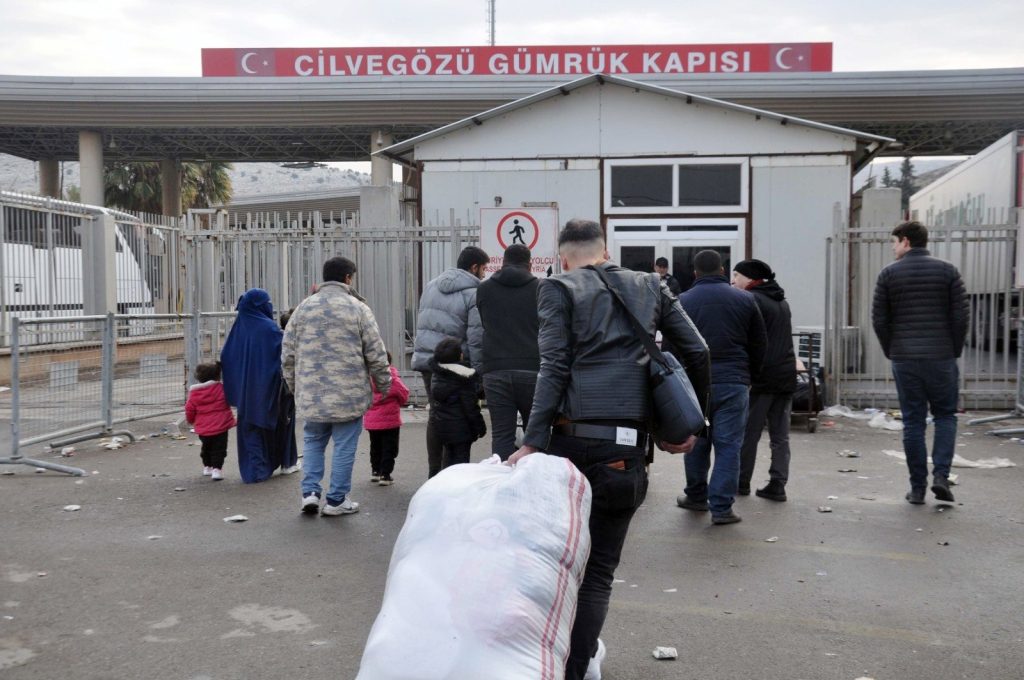Türkiye expects that many of the 3 million Syrian refugees it’s currently housing will quicken their return if anti-regime groups hold the city of Aleppo, which they wrested from Damascus last week.
But Interior Minister Ali Yerlikaya cautioned the time may not yet be ripe for large-scale population movements to Aleppo.
“We know those from Aleppo love Aleppo very much. We meet them and they are extremely enthusiastic,” Yerlikaya said Wednesday.
“But to those who say they wish to go back now we say, ‘Wait, it’s not safe for the moment,’” said Yerlikaya.
“Everyone hopes to return to their homeland as soon as they see or detect peace and security,” he added, noting that 42% of Syrians – amounting to 1.25 million people – now living in Türkiye hail from the Aleppo region.
“There will be strong interest” in a return, a burning issue in Türkiye, he predicted after Hayat Tahrir al-Sham-led (HTS) opposition groups last week took over Aleppo, Syria’s second city, which in more than a decade of war had never fallen out of Bashar Assad regime’s control.
Some 880,000 Syrians have taken refuge in the Turkish provinces of Gaziantep, Şanlıurfa and Hatay, which border Syria. Another 500,000 are registered in Istanbul, according to official statistics.
In total, Türkiye hosts more than 3 million Syrian refugees, one of the largest numbers in the world.
Türkiye, who has troops inside northern Syria backing the main opposition’s Syrian National Army (SNA) and fighting the PKK terrorist group’s Syrian wing, says some 110,000 Syrians have already returned home since the start of this year to a homeland that has endured 13 years of unrest.
Experts, however, do not expect to see a large wave of further returns as some of the refugees have spent more than a decade in Türkiye and around 1.5 million of them are minors who have had most if not all of their education in their host country.
“It is winter and so people will not want to return in the coming three or four months to destroyed homes and, moreover, to destroyed education and health systems,” one humanitarian worker in Türkiye told Agence France-Presse (AFP), while conceding some may return at least temporarily to monitor the situation in Aleppo.
The aid worker, speaking on condition of anonymity, said the extent to which people would head home would “largely depend on the speed with which ant-regime forces are able to consolidate or not their territorial gains.”
Turkish media on Thursday reported long lines of Syrian refugees at the Cilvegöz border gate in Hatay, waiting to cross over to return to their homes in Aleppo.
A Syrian man expressed joy over being able to reunite with their loved ones after only holding phone calls for years.
“With my wife and my three children, we came to Türkiye seven years ago. We have been missing our homeland for years. Türkiye has hosted us and we managed to save ourselves,” Abdulaziz Koman was quoted as saying by Turkish newspaper Sabah. “But now it’s time to return to our country. This return also means a new start for us.”
According to figures from the Interior Ministry released in October, 11,000 Syrian nationals go back to Syria monthly, while about 219,000 others are believed to have left for Europe overall.
Between 2016 and 2024, a total of 715,000 Syrians returned to their country. The number of those returning since June 1, 2023, reached 160,000. Voluntary returns to Syria are tied to the creation of safe zones in Syria’s north.
Türkiye launched several cross-border military operations in the region against terrorist groups Daesh and PKK/YPG in the past decade, helping the Syrian opposition gain control of wide swathes of land in the north.
Ankara also assists towns liberated from terrorism in reconstruction and rebuilding while charities construct briquette homes for returnees.
Türkiye last launched Operation Peace Spring on Oct. 9, 2019, under its right to self-defense as stipulated in Article 51 of the U.N. Charter to target terrorist groups, particularly the PKK/YPG, which threatened the national security in northern Syria.
Within four days, Turkish forces cleared the town of Ras al-Ain and a day later, Tal Abyad was liberated from terrorists. Overall, the operation secured more than 4,000 square kilometers (1,545 square miles) and approximately 600 settlements from terrorist control.
After the operation, Türkiye’s armed forces and the Syrian opposition forces focused on maintaining security and enabling displaced civilians to return home.
“Türkiye does not want terror zones, terrorist states or terrorist proxy regimes to take hold in northern Syria,” Yerlikaya said.
Since the establishment of local councils, which also provide job opportunities, the region has seen significant infrastructure improvements, including the resolution of water and power shortages.
Syrians make up the majority of the 4.4 million people registered as refugees and foreigners in the country.
Türkiye looks to accelerate their return in a dignified, voluntary way and repeatedly signaled its readiness to step up talks with the Assad regime for normalization of ties to ensure it.
Ankara and Damascus have made a push in recent years to mend ties severed in 2011 after Syria’s civil war began and Ankara deployed troops to back opposition forces and stave off PKK/YPG terrorists in the north.
In July, when President Recep Tayyip Erdoğan voiced a plan to invite his estranged Syrian counterpart for talks, Assad briefly floated the possibility of reviving Turkish-Syrian relations, claiming the withdrawal of Turkish troops from Syria was not a precondition for talks.
But the odds for negotiations seem to have dived with the anti-regime push into Damascus-held territories.


